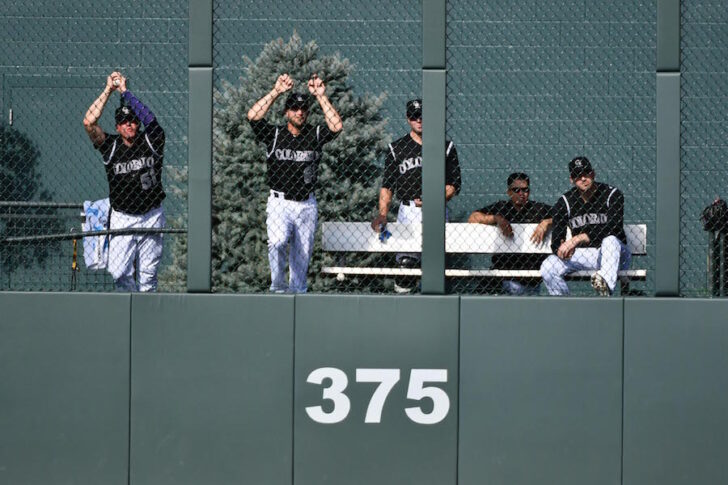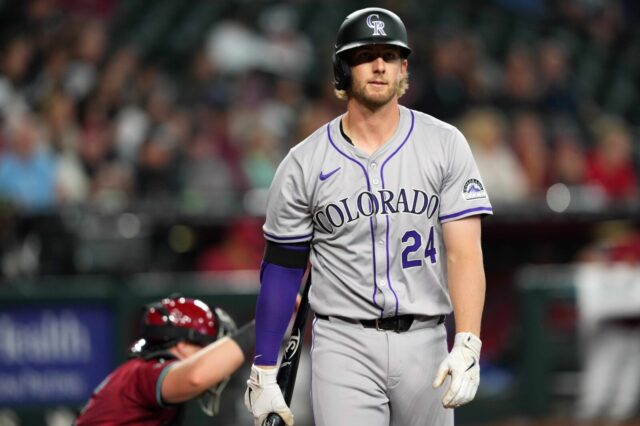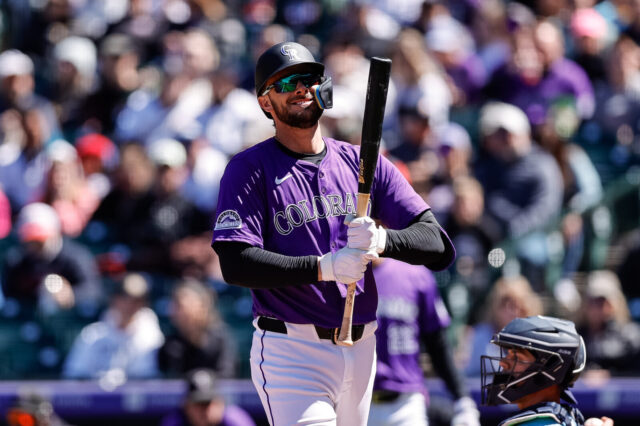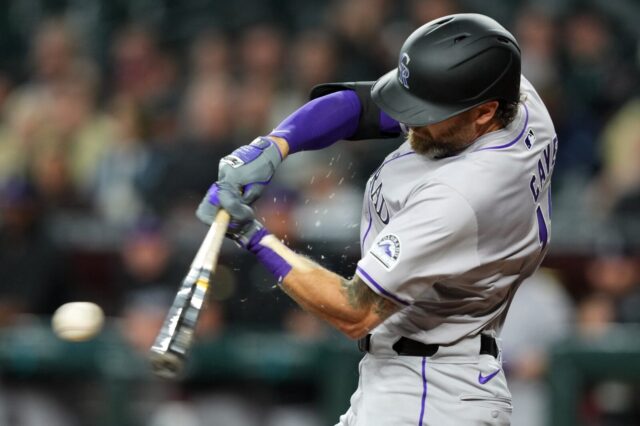The Colorado Rockies turned heads last season with their impressive 87-75 record, returning to the postseason for the first time in eight years while establishing themselves as a perennial playoff threat for the foreseeable future.
After years filled with shortcomings and underachievement, general manager Jeff Bridich figured out a way to tap into the minds and wallets of the Monfort family, the Rockies ownership group, which until recently have often been branded as cheap and disinterested in winning. The Rockies currently claim the 14th-highest payroll with $123.64 million dedicated to the 25-man roster which is a significant increase from 2017 ($105.03 million) and 2016 ($88,354,041).
After spending big to get the Rockies back to the postseason last year, Bridich and the Monforts opened the checkbook once again this offseason in an attempt to push the Rockies over the top to fortify the roster for a run at the World Series.
In their 11-8 loss to the Arizona Diamondbacks in the National League Wild Card game last year, the Rockies learned how vital a strong pitching staff is when playing in baseball’s big dance. Although starting pitcher Jon Gray put the Rockies in a poor position from the get-go by surrendering four earned runs in 1.1 innings pitched, the seven combined earned runs allowed from the bullpen ultimately killed Colorado in the long run.
With the expanded budget, the Rockies made an effort to add supreme talent to the bullpen by re-signing Jake McGee and adding right-handed pitcher Bryan Shaw — both to three-year, $27-million-dollar contracts. But they did not stop there as they signed All-Star Wade Davis to a whopping three-year, $52-million-dollar contract — the highest annual salary paid to a relief pitcher in the history of the sport. The deal has a fourth-year vesting option attached to it which could amount the contract total to $66 million if exercised.
Shaw was a member of the Cleveland Indians before signing with Colorado and served as an integral part of their bullpen in a recent stretch of dominance that includes a run to the World Series in 2016. Shaw has been one of the most durable relief pitchers in baseball over the past few seasons, having appeared in 475 games since he entered the league in 2011, the third-most appearances in baseball during that span. Shaw is also the only pitcher in the sport to have appeared in at least 70 games for five consecutive seasons. Shaw was 4-6 with an ERA of 3.52 last season.
Davis, a three-time All-Star, will replace Greg Holland as the Rockies closer for the coming season, much like he did in Kansas City just a few years ago. Davis logged 32 saves last season while posting an ERA of 2.30. He also registered the fewest blown saves in the National League last year, which will give the Rockies security at the end of games — something that was a problem in the final couple months of last year and was highlighted in the Wild Card loss.
McGee rejoins the Rockies following a pair of solid seasons in Colorado after spending time as a member of the Tampa Bay Rays. McGee was sharp for the Rockies last year as he recorded a 3.61 ERA and WHIP of 1.10 and helped propel Colorado to the Wild Card.
Between re-signing McGee, adding Shaw and Davis, and the other dollars already guaranteed to Chris Rusin, Adam Ottavino, and Mike Dunn, the Rockies have more than $100 million in guaranteed money tied up to relief pitchers which adds up to be the most expensive bullpen in baseball history. The Rockies are all-in on following the mold of the mega-bullpen idea established of the 2015 Kansas City Royals, 2016 Chicago Cubs, and 2017 New York Yankees among other teams.
The Rockies’ bullpen combined for an ERA of 4.40 last season which stands as the seventh-lowest mark in franchise history. Between the new additions and already established arms, Colorado and manager Bud Black will have a nice mix of weapons to choose from on a nightly basis.
Shaw, McGee, and Daivs are penciled in to fill the seventh, eighth, and ninth inning roles which give the Rockies one of the strongest back-end bullpens in the sport. Adam Ottavino also can be an impact arm for the Rockies if he can manage to establish some level of consistency on the mound. Between his plus fastball and wipe-out slider, Ottavino has flashed his ability to be a power pitcher for the Rockies, but his 5.06 ERA in 2017 begs to differ.
Ottavino is one arm the Rockies have in the bullpen with the potential to be superb.
Carlos Estevez is another pitcher who has shown in spurts he has the potential to be a plus option in the bullpen for Colorado. Despite spending a majority of the season in the minor leagues last year, Estevez was good enough in his time at the major league level and demonstrated enough poise on the mound to warrant an appearance in the Wild Card game. If he can continue to mature and improve his control, he should be able to find a home within the Rockies bullpen.
Dunn and Scott Oberg had up-and-down seasons in 2017 but were relied upon consistently throughout the year. They have the potential to grow and serve as reliable relief options for Colorado as does youngster Zac Rosscup.
The Rockies best and most consistent bullpen pitcher last season was Chris Rusin. Rusin was excellent and served as a swiss-army knife for the Rockies having pitched in both short and long relief situations at a highly productive level. Rusin logged the most innings pitched on the team and posted an astounding 2.65 ERA with a record of 5-1.
The Rockies bullpen will probably look like this come Opening Day:
Wade Davis (CL) – RHP
Jake McGee – LHP
Bryan Shaw – RHP
Adam Ottavino – RHP
Chris Rusin – LHP
Mike Dunn – LHP
Scott Oberg – RHP
Carlos Estevez – RHP
Zac Rosscup – LHP
There is the potential for a couple of young starters to join the relief force. Jeff Hoffman and Tyler Anderson are two candidates to spend some time in the bullpen; however, that will likely be decided throughout Spring Training.
With what the Rockies have managed to build in the bullpen over the past few seasons paired with their recent offseason additions, the ‘pen has transformed from a weakness to a source of strength and focal point in which the Rockies will rely on to win for the coming season.
It will indeed be intriguing to see if Colorado’s investment will pay off both this season and in the long run. The recent moves have certainly caught the eye of many around the sport as the Rockies’ popularity has started to increase. Former Rockies pitcher and current Seattle Mariners general manager Jerry Dipoto called the Rockies’ offseason moves “brilliant” on a podcast for The Denver Post. The additions are expected to help Colorado compete for the top spot in the ultra-competitive National League West.
The 2018 season will not be easy for the surging Rockies. The Giants have made major investments up and down their roster, and the Dodgers and Diamondbacks are coming off 104 and 93 win seasons respectively. But with the Rockies offense being as lethal as ever and a young starting rotation ready to break out, loading up on bullpen talent was a smart play to ensure the late-game heartbreak the Rockies have become accustomed to over the years is a thing of the past.



